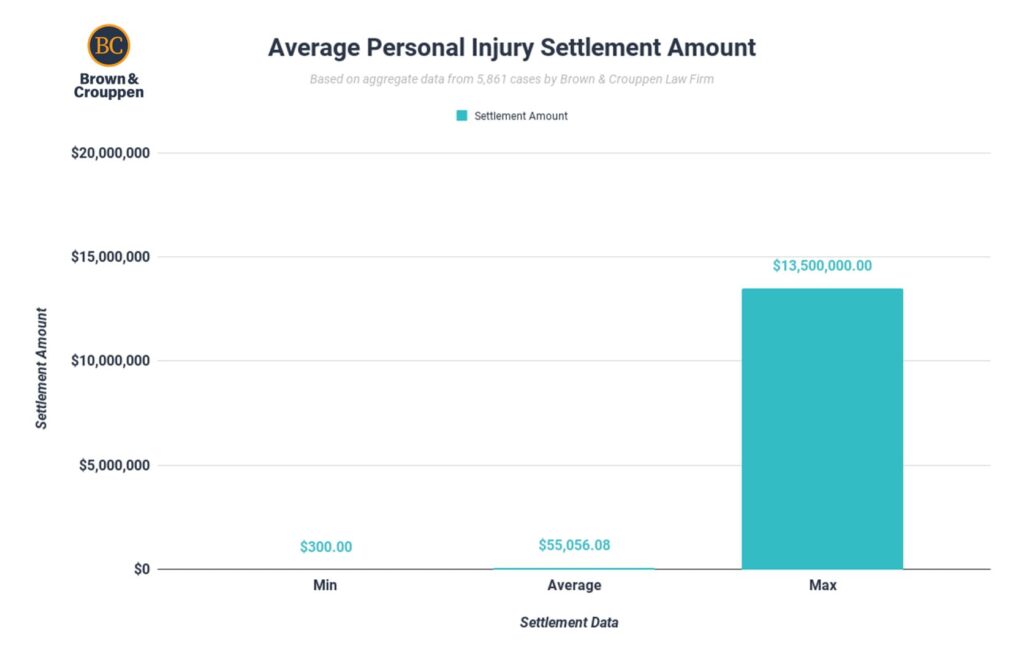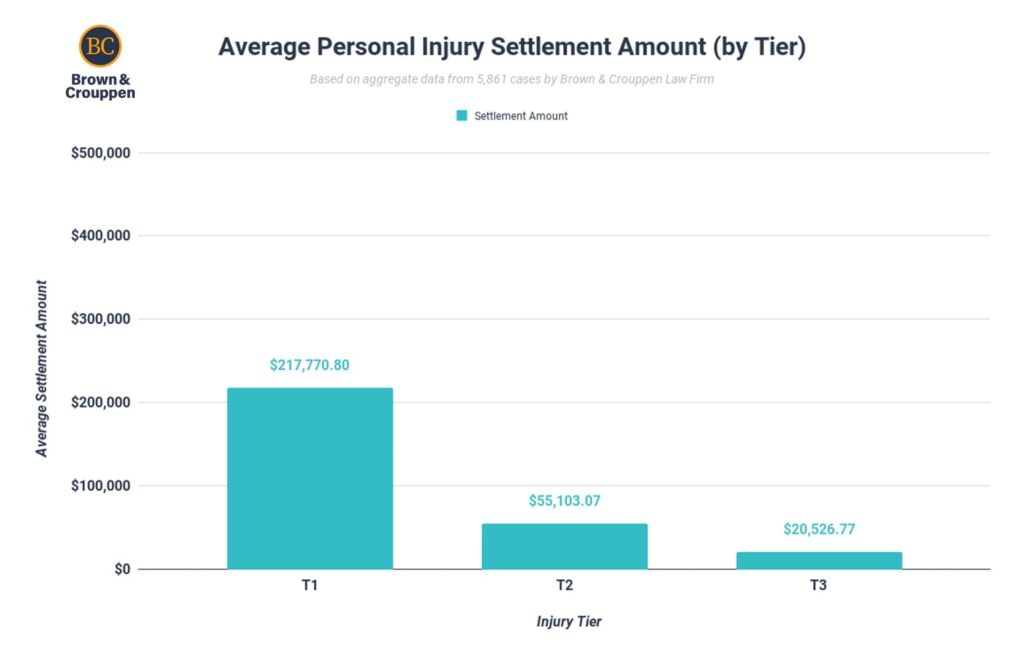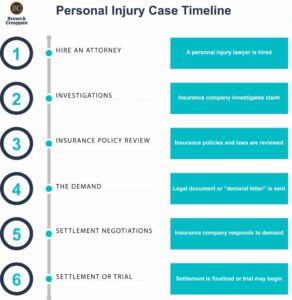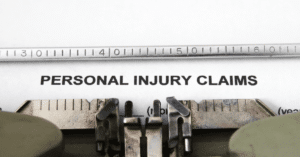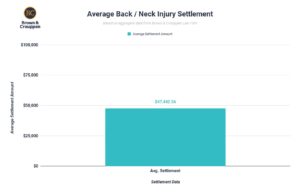The biggest determining factor used when determining the average personal injury settlement amounts is the severity of injuries as shown in the chart above and details below:
- Tier 1 injuries: Severe injuries including permanent disfigurement, traumatic brain injuries, spinal cord injuries, or death.
- Tier 2 injuries: Complex injuries such as broken bones and lacerations.
- Tier 3 injuries: Soft tissue injuries such as sprains, strains, and contusions.
Accidents types are grouped by tiers of injury as detailed above and the data retrieved includes settlement amounts for many different injury types, including motor vehicle accidents, slip and falls, medical malpractice, dog bites, wrongful death, and more. Accordingly, this average should not be interpreted as a standard amount for every personal injury victim to expect. The circumstances surrounding every personal injury are unique, and so are the characteristics of each individual personal injury victim.
Case study findings for other types of personal injury cases are as follows:
- Average auto accident settlement: $37,248.62
- Average truck accident settlement: $103,654.08 (includes all commercial trucks)
- Average motorcycle accident settlement: $66,107.6 (victim was a motorcyclist)
- Average pedestrian accident settlement: $67,511.90
- Average workers’ compensation settlement: $29,750.10
- Average slip & fall settlement: $10,000+
- Average dog bite settlement: $97,517.86
Additionally, our firm has settlement data surrounding specific types of injuries, which is summarized in the table below. Generally, the more severe the injuries, the higher the settlement value. However, this can still vary based on many case factors such as supporting evidence, degree of fault, and other applicable legal considerations.
| Injury | Average Settlement |
|---|---|
| Back and Neck | $47,442.56 |
| Concussion | $103,654.08 |
| PTSD | $10k+ |
| Rotator Cuff | $30K+ |
Personal Injury Settlement Examples
At Brown & Crouppen Law Firm, our personal injury attorneys have helped thousands of clients recover compensation for their personal injury cases as a result of settlement and verdicts.
Here are some personal injury settlement amounts examples and cases:
- $7.5M settlement for a work-related accident
- $6M settlement after injuries suffered from box truck accident
- $390K truck accident settlement after tractor trailer collision
- $450K car accident settlement after injury from drunk driver
- $375K motorcycle accident settlement plus UIM benefits
- $300K auto accident settlement after rear-end collision
- $100K settlement after pedestrian was struck by a car
If you or a loved one has been injured in an accident, get help from a personal injury lawyer at Brown & Crouppen Law Firm. Our attorneys help clients recover compensation for damages including physical, emotional, and economic injuries.
Factors That Affect Personal Injury Settlement Value
The main factors used to calculate a personal injury settlement amount are as follows:
1. Severity of Injuries
The most important factor that contributes to the amount you can recover in settlement is the severity of your injuries. What settlement amount will make you “whole” will vary significantly based on the nature of your injuries. As mentioned above, once you receive money in exchange for a settlement agreement, you are releasing the wrongdoer forever for any liability related to the accident, meaning you agree that you are not going to pursue further legal action or ask for further compensation in the future. When entering a settlement agreement, it is your one-and-done chance to be made whole and to put you back in your rightful position
If you suffer soft tissue injuries, it’s possible that you’ll return to your pre-accident status with medication, some time off work, and a few visits to the chiropractor or physical therapist. However, if you suffer permanent, life-changing injuries, you arguably may never be put back in your rightful position. These are arguments your attorney will make during the personal injury lawsuit process and settlement negotiations.
Again, it is worth mentioning that the circumstances surrounding every personal injury are unique, and so are the characteristics of each individual personal injury victim. For example, two individuals can break their leg, but one individual may require more treatment and have a longer recovery period due to a number of factors such as age, pre-existing medical conditions, and compliance with treatment plans. Accordingly, the average settlement amounts above should not be interpreted as a standard amount for every personal injury victim to expect.
2. Pain & Suffering
Often, the biggest loss suffered by someone who suffers an injury are those things that are not tangible: Pain, suffering, and the loss of enjoyment of daily life activity both past and future. These losses are harder to assign a number. Again, entering a settlement agreement is your one-and-done chance to be made whole and to put you back in your rightful position. In deciding what is fair and reasonable, your lawyer will discuss with you what amount should adequately compensate you now while also accounting for any pain and suffering you might possibly endure in the future. This means considering the following:
- Will you require more medical treatment down the road? (Evidence of requiring further treatment can come from the advice of your treating physicians.)
- How has the accident affected your daily activities? (Are there activities that you could perform before the accident that you can longer perform? Are there activities that you have to perform differently or with pain due to the accident?)
- Are your injuries acute or chronic in nature? (Meaning, did you receive treatment for injuries, and they resolved after a few weeks or months, or are your injuries of a nature that your pain continues to return and you require ongoing treatment?) Mental and emotional disorders such as post-traumatic stress are also taken into consideration when your lawyer offers evidence of your pain and suffering.
Even if you feel content or pain-free immediately after receiving treatment for your accident-related injuries, consider the possibility of pain flare-ups or reoccurring thoughts of the accident that might occur in the future. Again, a settlement agreement is meant to put you back to your rightful position, and that includes considering how you will be affected by this accident later in life.
3. Medical Bills & Lost Wages
Numerous damages or losses are also taken into consideration when your lawyer is negotiating a settlement amount. One type of damage you may be entitled to is compensation for medical expenses. This includes medical expenses you have incurred as a result of the accident and those medical expenses you are reasonably certain to incur in the future. These expenses include doctor visits, surgical costs, out of pocket expenses (such as crutches, bandages, braces, etc.), prescriptions, co-pays, therapy, physical therapy, chiropractic therapy, or gas money for doctor appointments.
However, it should be noted that the amount of medical expenses claimed could be limited to the actual amount paid or the amount due for medical expenses, as opposed to the amount of medical expenses billed by a medical provider. For this reason, an attorney may decide that seeking compensation for paid or due medical care may lower the value of a claim. An attorney decides this when that dollar amount does not reflect the true value of the losses losses suffered by a client in a car crash.
Much like medical expenses, time lost from work can be claimed in compensation for your injury. Loss of wages for work that is reasonably certain to be missed in the future will also be sought. Likewise, if you are permanently disabled and unable to work or unable to work in the same career/position, a calculation of future lost wages and/or retraining may be included in the compensation.
4. Insurance
How much money you can receive in settlement largely depends on the insurance coverage available. Insurance coverage is the most common source of recovery. The insurance coverage available will vary greatly depending on the wrongdoer and their insurance policy. For example, if your injury is caused by an uninsured individual, that individual may not have the resources to pay a judgment against them.
If your injury is caused by an insured individual, the amount you can recover in settlement may be limited to the limits of their insurance policy. The limits of each individual’s insurance policy will vary depending on how much insurance that individual can afford. For example, a business or large corporation will likely have more coverage and higher limits on their insurance policy than the average individual.
A personal injury attorney can help with settlement negotiations by uncovering policy limits, negotiating with the insurance company, and ultimately ensuring that you are compensated fairly after an accident.
5. Fault
The fault of each party is an enormous factor taken into consideration during settlement discussions. A wrongdoer is only going to pay for the injuries that resulted from their wrongdoing. In other words, a wrongdoer is going to put up a fight and be reluctant to pay the entire settlement amount you ask for if there is any evidence that you were also at fault in the incident or contributed to your own injuries. However, fault and other negligent actions on behalf of the wrongdoer can increase the compensation you receive.
6. Trial (If Applicable)
Trials are time-consuming, expensive, and mentally exhausting for all parties involved. Additionally, once a controversy reaches the trial phase, a jury decides whether you should be awarded money and how much. Accordingly, the desire to avoid going to trial motivates both parties to reach a private settlement agreement outside of the courtroom. Avoiding the publicity of the trial, the stress of preparing for trial, and leaving the fate of your award in the hands of the jurors are all persuasive reasons to reach a settlement agreement outside of the courtroom.
All of these things should be taken into consideration when deciding on a fair and reasonable settlement amount, and your attorney will use it as a bargaining tool: How much is the wrongdoer willing to pay to avoid trial? How much are you willing to accept in order to avoid trial?
What Is A Settlement Agreement?
A personal injury settlement is a monetary award the wrongdoer pays to put you back in your rightful position; that is, the position you were in before you were injured. Settlement agreements can be entered into prior to filing a lawsuit or after a lawsuit has already been filed.
The amount of money someone receives in settlement, pre-lawsuit or after a lawsuit is filed, is intended to make the injured party “whole” again. This principle is commonly referred to as compensatory damages. It is recognized that many injured people will never return to their exact pre-injury position, but monetary settlements are the only system we have to compensate injured parties.
When the wrongdoer pays a settlement amount, you are agreeing to release them from any responsibility for the injuries you sustained in the accident. In other words, once you receive a settlement from the wrongdoer, you are agreeing that the problem is settled and that you cannot pursue legal action by filing a lawsuit against them in the future.
The attorneys at Brown & Crouppen are experienced in fiercely negotiating settlement amounts and advocating for their clients to ensure they are being fairly and adequately compensated. There are many different factors that must be taken into consideration when a personal injury lawyer is negotiating a settlement agreement on your behalf. Your lawyer will discuss these factors in detail with you, and together, you will decide what fair and reasonable amount to ask for from the wrongdoer.
What To Expect From A Personal Injury Settlement
Remember that the amount of average personal injury settlements should not be interpreted as a standard amount or expected payout for every case. Most personal injury cases will likely fall above or below the average.
The attorneys at Brown & Crouppen Law Firm are experienced in fiercely negotiating settlement amounts and advocating for their clients to ensure they are being fairly and adequately compensated. If you believe that you have a case, get started by requesting a free case evaluation to talk to your personal injury attorney openly and honestly about how your injuries have affected you. They will discuss all the factors that should be taken into consideration when deciding a settlement amount for your personal injury claim.

